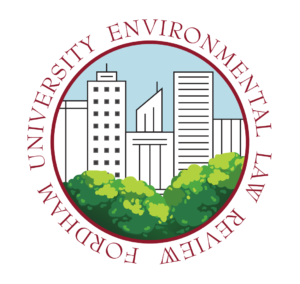Spotlight Series #1: Jess Phelps – Process, Balance, Focus
By Michael Albalah, Managing Editor, Fordham Environmental Law Review
Jess Phelps is associate general counsel at The Lyme Timber Company LP (“Lyme”), a private timberland investment manager, based in Hanover, New Hampshire. He also is an adjunct professor at the Vermont Law School. When I reviewed his professional experience in preparation for our conversation I couldn’t help but notice that he has operated within the main constituencies relevant to environmental law (clerkship, large and small law firm settings, non-profit work, service as an agency attorney, and now working in-house). After clerking and working in Big Law, he worked in-house at Historic New England, and as an Attorney-Advisor in the USDA’s Office of General Counsel in the Natural Resources and Environment Division, in Washington DC. But throughout his career, he has continued to consistently produce highly regarded contributions to scholarship with articles published at the some of the most elite environmental law journals.
Jess shared his personal relationship with natural resources and tied it to our universally shared story of national public conservation efforts. He grew up on a working farm and identified the role of ‘place’ as being central to his career and scholarship. That experience informed his sense that conservation and working land need not always exist in tension. His professional life mirrors these principles as Jess has worked to steward both public and private land. That makes him particularly suited to help me understand how best to serve our common natural resources.
In his ‘day job’, Jess helps the Lyme Timber Company LP manage approximately 1.5 million acres of forestland and rural real estate. Lyme specializes in the negotiation and sale of working forest conservation easements that restrict development on lands but they also generate revenue form sources such as sustainable timber harvesting, recreational leasing and the sale of forestry-based carbon-offsets. They also work with conservation partners to permanently conserve targeted high-priority conservation lands.
As noted, before Jess joined Lyme he was already working on some of the same issues. Post-clerkship and after working in a large law firm, he worked to preserve historic properties at Historic New England, the oldest and largest regional preservation organization in the United States. As part of their historic preservation mission they acquire and steward conservation easements on historic properties and landscapes dating from the seventeenth century through the buildings of the mid-century modern movement. It was here that Professor Phelps both did traditional law work, but also participated in the decision making of the organization. He learned that he enjoyed the added responsibility of shaping strategy and being part of an executive team.
Jess next worked in the United States Department of Agriculture. In his role as attorney-advisor in the Office of General Counsel, Natural Resources and Environment Division he worked on implementing the Agricultural Act of 2014 or the “2014 Farm Bill” specifically with the Natural Resources Conservation Service and Forest Service. I found it interesting that here he began to really understand how conservation policy is ultimately developed and implemented.
Three specific recommendations stuck with me from our conversation.
First, it isn’t necessary or even always possible to start working in environmental law right away. Jess first had a clerkship and then worked as a litigation associate before landing a position in this area. He credits showing interest in this area and building a professional network as allowing him to successfully build a career in environmental law.
Second, write, write, and write some more. Jess tries to stick to a daily writing schedule where he writes in the morning for about half of the days of the week and one day on the weekend. This means he’s always learning. Additionally, published work demonstrates interest and he thinks young lawyers should write to build subject matter expertise. Lastly, it also provides a good professional network that helped land him at Lyme Timber and as an adjunct at Vermont Law.
And third, Jess shared a behind-the-scenes perspective of the hiring process for many environmental law-related jobs. He said employers get many applications but quickly toss the ones that aren’t tailored, even if they come from elite or competitive candidates. He stressed that if you can demonstrate interest, and you communicate that interest, you could land a job where you might not think you are competitively advantaged. He cautioned against expressing general interest; don’t use your cover letter to just tell how much you care (such as indicating an interest in hiking/being outdoors), but also use it to show specific things you did that demonstrate your interest in environmental law as a career (involvement with an environmental journal, participation in the environmental law society, coursework, etc.).
It might take time, but if you do good work, use writing to build expertise, develop and use your network, you can often get to the job you want. You often need to cultivate a career in environmental law over time. That’s not unlike the strategy needed for sustainable land management.


